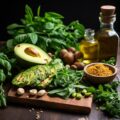The Delicious World of Healthy Fats: Nourishing Your Body and Soul
When we think of fats, we often picture greasy fast food or decadent desserts. But the truth is, our bodies need healthy fats to thrive. The right fats can boost our mood, nourish our cells, and even help us maintain a healthy weight. Let’s explore some of the most delicious and nutritious fat-rich foods that can enhance our wellbeing and bring joy to our meals.
Avocados: Nature’s Creamy Superfood
Avocados are a true gift from nature. These creamy, versatile fruits are packed with heart-healthy monounsaturated fats, fiber, and essential nutrients. Adding avocado to your diet can help reduce inflammation, support brain health, and even improve skin texture. Try spreading mashed avocado on whole-grain toast for a nourishing breakfast, or blend it into a smoothie for a velvety texture.
Nuts and Seeds: Tiny Powerhouses of Nutrition
Nuts and seeds are small but mighty when it comes to nutrition. Almonds, walnuts, chia seeds, and flaxseeds are excellent sources of healthy fats, protein, and fiber. They can help reduce the risk of heart disease, support weight management, and provide sustained energy throughout the day. Sprinkle a handful of mixed nuts and seeds over your morning oatmeal or yogurt for a delightful crunch and nutritional boost.
Olive Oil: The Mediterranean Miracle
Olive oil, a staple of the Mediterranean diet, is renowned for its health benefits. Rich in monounsaturated fats and antioxidants, it can help reduce inflammation, lower cholesterol levels, and protect against chronic diseases. Drizzle extra virgin olive oil over salads, use it for light sautéing, or dip whole-grain bread in it for a simple, wholesome snack. Remember, a little goes a long way in both flavor and nutrition.
Fatty Fish: Omega-3 Goodness from the Sea
Fatty fish like salmon, mackerel, and sardines are excellent sources of omega-3 fatty acids, which are essential for brain function, heart health, and reducing inflammation. These fish also provide high-quality protein and important vitamins and minerals. Aim to include fatty fish in your diet at least twice a week. Grilled salmon with a side of roasted vegetables makes for a delicious and nourishing meal.
Dark Chocolate: A Sweet Treat with Benefits
Yes, you read that right! Dark chocolate, when consumed in moderation, can be part of a healthy diet. It contains heart-healthy fats, antioxidants, and compounds that may improve mood and cognitive function. Look for dark chocolate with at least 70% cocoa content to maximize the benefits. Enjoy a small square after dinner as a mindful treat, savoring each bite and allowing yourself to fully experience the rich flavors.
Incorporating Healthy Fats into Your Diet: Tips and Ideas
Now that we’ve explored some of the healthiest fat-rich foods, let’s discuss how to incorporate them into your daily meals:
- Start your day with a smoothie made with avocado, chia seeds, and a handful of spinach for a creamy, nutrient-dense breakfast.
- Use olive oil as a base for homemade salad dressings, adding herbs and a splash of lemon juice for extra flavor.
- Keep a mix of nuts and seeds at your desk for a satisfying afternoon snack.
- Experiment with different types of fatty fish in your weekly meal plan, trying new recipes to keep things interesting.
- Enjoy a small piece of dark chocolate with a cup of herbal tea as a relaxing evening ritual.
Remember, the key is balance and moderation. While these foods are nutritious, they are also calorie-dense, so be mindful of portion sizes. Listen to your body and enjoy these foods as part of a varied, colorful diet rich in fruits, vegetables, whole grains, and lean proteins.
Frequently Asked Questions About Healthy Fats
1. Can eating fat help me lose weight?
Yes, incorporating healthy fats into your diet can actually support weight loss. Fats help you feel fuller for longer, reducing overall calorie intake. They also play a crucial role in hormone balance and metabolism. However, it’s important to consume fats in moderation as part of a balanced diet and active lifestyle.
2. How much healthy fat should I eat each day?
The Dietary Guidelines for Americans recommend that 20-35% of your daily calories come from fats, with an emphasis on healthy fats. For a 2,000-calorie diet, this translates to about 44-77 grams of fat per day. However, individual needs may vary based on age, gender, activity level, and overall health status.
3. Are all saturated fats bad for you?
While it’s generally recommended to limit saturated fat intake, not all saturated fats are created equal. For example, the saturated fats in coconut oil and dark chocolate may have some health benefits. However, it’s still best to focus on unsaturated fats from sources like avocados, nuts, seeds, and olive oil as your primary fat sources.
4. Can children eat fat-rich foods?
Yes, children need healthy fats for proper growth and development, especially for brain function. Offer children a variety of healthy fat sources like avocados, nuts (if not allergic), and fatty fish. However, it’s important to provide these foods in age-appropriate portions and as part of a balanced diet.
5. How can I add more healthy fats to a vegetarian or vegan diet?
There are many plant-based sources of healthy fats suitable for vegetarian and vegan diets. These include avocados, nuts, seeds, olive oil, coconut, and plant-based oils like flaxseed or hemp seed oil. You can also find omega-3 fortified foods or consider algae-based omega-3 supplements if you don’t consume fish.
Embracing healthy fats in your diet is not just about nutrition—it’s about nourishing your body and soul with delicious, satisfying foods. As you explore these fat-rich options, remember to approach your meals with mindfulness and gratitude. Enjoy the flavors, textures, and the knowledge that you’re doing something good for your health. Here’s to a life filled with joy, wellness, and the occasional piece of dark chocolate!









